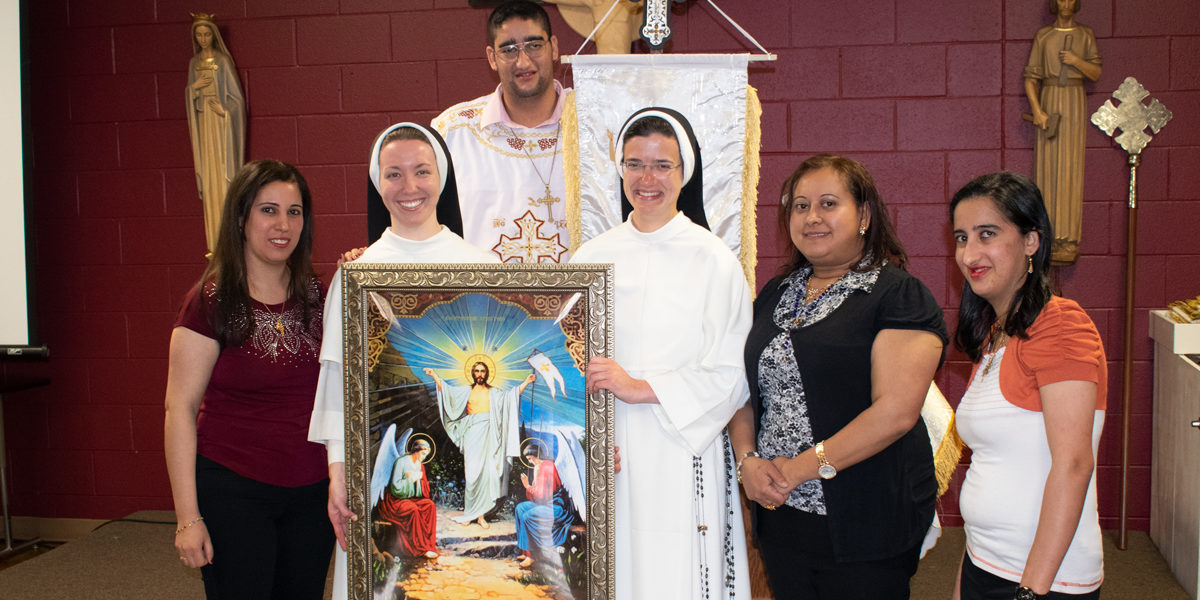Egyptian Catholics’ Spiritual Home in Nashville
Posted on Friday, May 17, 2019
Bright smiling faces peer up at the sisters with joy and a bit of shyness. Children of the Egyptian families of Mother of Divine Mercy Coptic Catholic Community in Nashville attend lessons in the faith each Sunday. But it is not only a class: it is a special encounter.
Fr. Elia Gawarge, pastor of Mother of Divine Mercy, welcomes each family at the entrance. “They want to find their spiritual home. We want them to find it here.”
Sister Cecilia climbs the stairs of the Catholic Pastoral Center with a plate full of breakfast offered by the eager faces: pita bread stuffed with baloney and soft cheese, and french fries. The community will not let her get away without offering warm hospitality. Sister is a student at Aquinas College, and member of the Dominican Sisters of St. Cecilia Congregation.
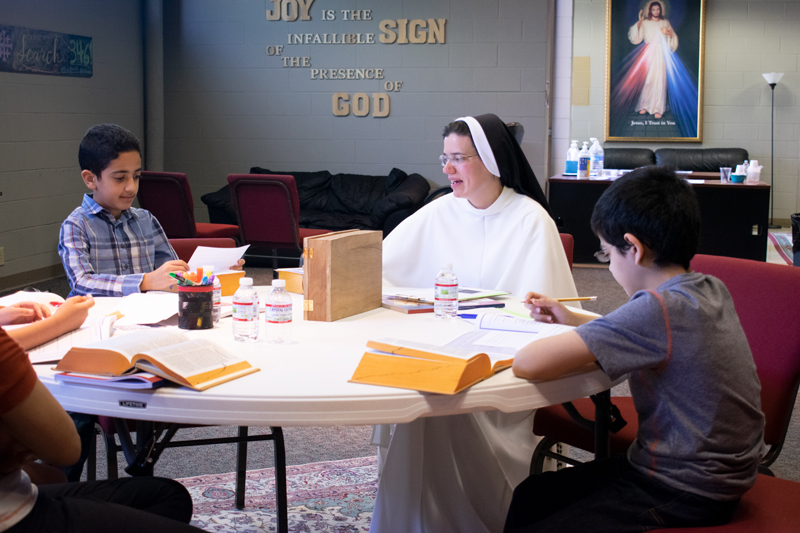
Sister Cecilia and Sister Anna Maria serve at Mother of Divine Mercy as catechists on Sundays. Along with six men and women of the parish, the sisters and lay catechists form a team that teaches the children of over thirty registered families at Mother of Divine Mercy.
“We learn a lot from Mr. Abanoub. I team teach with him. The children in his Saturday night class learn a lot.” Sister Anna Maria refers to Abanoub, a catechist and member of the parish who regularly serves Mass offered by Fr. Elia in the Alexandrian rite. In the Roman Catholic Church, children who serve Mass are called altar servers. In the Coptic Catholic Church, they are called deacons. Children who serve as deacons attend a special class on Saturday, during which Abanoub teaches them how to serve at the Divine Liturgy.
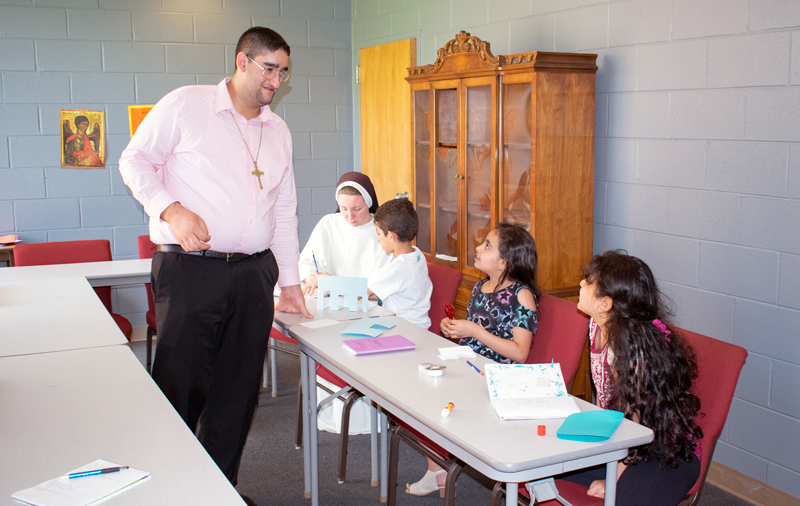
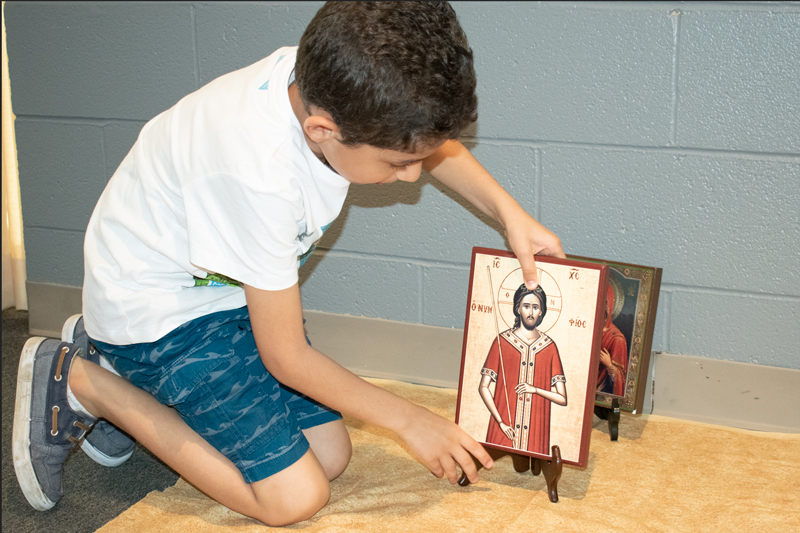 At catechism class April 26, Divine Mercy Sunday in the Roman calendar, Marshall sets up the sacred space in the third and fourth grade meeting room. He carefully carries two icon stands to the carpet and lays a special fabric across the floor. Returning to the cabinet, Marshall brings with two hands the special icon of Mary and places it on the stand, and then the icon of Jesus on the stand in front of it. Each child in the class takes special care of the sacred objects and images.
At catechism class April 26, Divine Mercy Sunday in the Roman calendar, Marshall sets up the sacred space in the third and fourth grade meeting room. He carefully carries two icon stands to the carpet and lays a special fabric across the floor. Returning to the cabinet, Marshall brings with two hands the special icon of Mary and places it on the stand, and then the icon of Jesus on the stand in front of it. Each child in the class takes special care of the sacred objects and images.
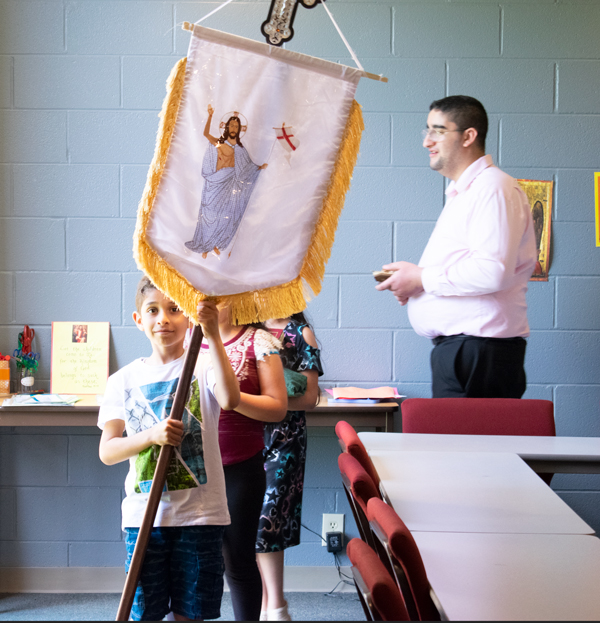 About half way through the class it is time for a procession of faith. The group sings a short hymn with winding and curling melodies, songs springing from the centuries-old Coptic tradition, telling of the resurrection of Jesus and praising the Word of God. Such a sound is not heard except in these faith communities: Christians who have been persecuted for their faith, have migrated to the United States, and who continue to pass their living faith in Christ to the young people. Marshall carries a visual reminder of the resurrection, the cross and banner.
About half way through the class it is time for a procession of faith. The group sings a short hymn with winding and curling melodies, songs springing from the centuries-old Coptic tradition, telling of the resurrection of Jesus and praising the Word of God. Such a sound is not heard except in these faith communities: Christians who have been persecuted for their faith, have migrated to the United States, and who continue to pass their living faith in Christ to the young people. Marshall carries a visual reminder of the resurrection, the cross and banner.
The procession leads to a sharing of the Word in the sacred space.
The Coptic Church in Egypt traces its Christian roots to the evangelization of Egypt by St. Mark the Apostle.This ancient Christian community, whose primary see is in Alexandria, Egypt, accounts for 1% of the world’s Eastern Catholic Churches in union with Rome, according to statistics of the Catholic Near East Welfare Association (2017). Although relatively small in number, Coptic Catholics witness to a living faith and liturgical life that is vibrant and enriching for all who encounter it.
At Mother of Divine Mercy Coptic Catholic Community in Nashville, Egyptian families find a faith-filled atmosphere in which to celebrate: deeply Coptic and Egyptian, but at the core, Catholic. Sunday Liturgy is celebrated in the Alexandrian rite incorporating Arabic, Coptic, English, and Greek languages.
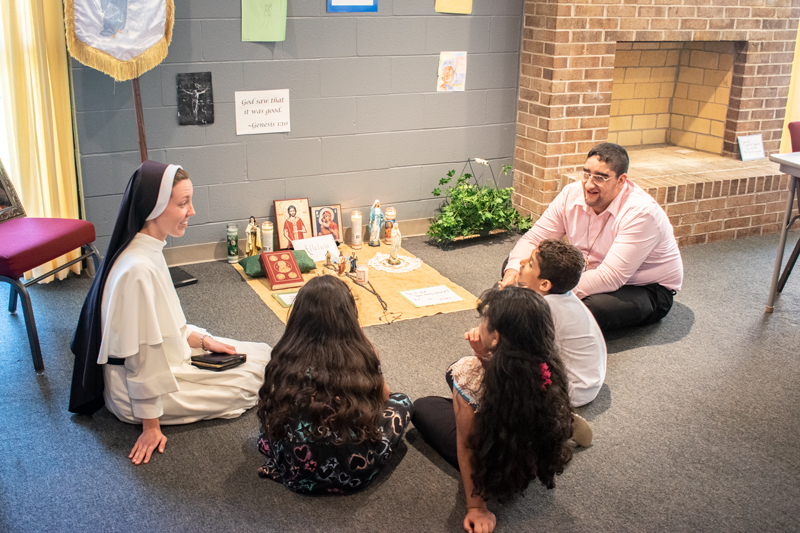
Students from Aquinas College have been part of the catechist team since 2017. While most of them normally worship in the Roman rite, each has found the experience at Mother of Divine Mercy to be broadening and at the same time full of teachable moments.
“The classes seek to deepen the children’s love for the faith – love and fidelity,” said Sister Cecilia. Teaching the students prayers such as the rosary provides the children with ways to reflect on the Word of God and to pray for others. Through this, Sister Cecilia believes the children can become more aware of their union with the universal Church.
Fr. Elia is a true spiritual Father to these families. “To form men and women according to the Catholic faith,” he reflects, “to form in them awareness of a solid Catholic identity, that is Coptic, yes, that is Egyptian, yes, but fundamentally, Catholic Christians: that is my hope for the growth of the community here.” Fr. Elia, an Egyptian priest assigned in Nashville, works with families to sort through the cultural differences in their new country. Sunday meetings with parents, called “Cana of Galilee” provide time for this dialogue. Fr. Elia affirms the source of the community’s strength: union with Christ.
The Aquinas students share the faith they have received, but also receive a lot in return. Both sisters study toward degrees in education and draw on their Aquinas classes and religious formation in preparation for the lessons at Mother of Divine Mercy. Learning from the children, their awareness of the mystery of faith has deepened.
The rich cultural encounter with this local parish community offers more than just a classroom – it is a window into what it means to be Catholic – universal – and in solidarity with the suffering Church.
